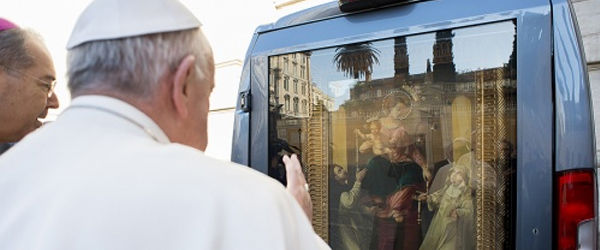It is possible the world's cardinals will not begin meeting at the Vatican until March 4, and they cannot set a start date for the conclave until they have met, the Vatican spokesman said.Jesuit Father Federico Lombardi, Vatican spokesman, said Cardinal Angelo Sodano, dean of the College of Cardinals, will send out letters March 1 — a Friday — formally informing the world's cardinals that the papacy is vacant and calling them to meet at the Vatican."It is likely they will not meet Saturday or Sunday," he said, so the meetings are unlikely to begin before March 4. As of Feb. 26, he said, it was impossible to say how long the cardinals would want to meet before they feel ready to announce a date for the conclave to begin.The formal convocation, he said, will be sent by email or fax for immediacy, but hard copies will be mailed to the cardinals' permanent residences so they'll have a copy for their archives.In addition, he said, while many cardinals were arriving in Rome before the papacy ended Feb. 28, "the cardinals will not live at the Domus Sanctae Marthae," the Vatican guesthouse used during the conclave — "until almost the eve of the conclave."The rooms must be cleaned, the televisions and telephones disconnected and the place swept for listening devices, Father Lombardi said. "It's completely normal."Another reason why they don't move in right away, he said, is because the rooms — either simple singles or suites — are distributed by lot once the majority of the cardinals are present.Last week, Pope Benedict XVI issued new rules for conclaves, including a clause that allows the College of Cardinals to move up the date for the beginning of the conclave to elect his successor.Pope Benedict also defined the exact penalty — automatic excommunication — that would be incurred by any non-cardinal assisting the College of Cardinals who failed to maintain absolute secrecy about the conclave proceedings.The pope laid out the new rules in an apostolic letter issued "motu proprio" (on his own initiative) Feb. 22, the feast of the Chair of St. Peter. The Vatican released the document Feb. 25.The changes affect the rules established in Blessed John Paul II's apostolic constitution governing the election of popes, "Universi Dominici Gregis."Under the current rules, which remain in effect, upon the vacancy of the papacy, cardinals in Rome "must wait 15 full days for those who are absent" before they can enter into a conclave and begin the process of electing a new pope.But Pope Benedict inserted an additional provision that grants the College of Cardinals "the faculty to move up the start of the conclave if all the cardinal-electors are present," as well as giving them the ability "to delay, if there are serious reasons, the beginning of the election for a few more days."However, the conclave still must begin no more than 20 days after the start of the "sede vacante."The date of the start of the conclave is to be decided by all the cardinals, including those over the age of 80, who participate in the daily general congregations or discussions that precede a conclave, said Archbishop Pier Luigi Celata, the vice chamberlain. He will assist Cardinal Tarcisio Bertone in the administration of the church during the "sede vacante."The cardinals must wait for every cardinal-elector to arrive or to have sent a legitimate excuse for their absence, such as for reasons of infirmity or serious illness, he told journalists.The date of the start of the conclave will then be determined by a majority vote, that is 50 percent plus one of the cardinals present, Archbishop Celata said.The other major change to the rules is that the pope defined the exact penalty incurred by support staff assisting the cardinal-electors during a conclave if they break the oath of secrecy about the proceedings.The aides must swear to never lend support to or favor any outside interference in the election process. Under the old rules, the penalty for breaking the vow was to be determined by the future pope.Instead, Pope Benedict has rewritten the oath that staff will take, stating that they are "aware that an infraction will incur the penalty of automatic excommunication.""The Holy Father wanted to make things immediately clear and not pass the burden of deciding the penalty on to his successor," said Archbishop Celata.The penalty for cardinals who break the oath of secrecy, however, remains unspecified.The apostolic letter included several other minor changes and clarifications, including the addition of the phrase "at least" to a two-thirds majority when defining a valid election of a pope."For the valid election of the Roman pontiff at least two thirds of the votes are required, calculated on the basis of the total number of electors present," says the revised rule.Also added were details about who and how many people outside the College of Cardinals can assist during the conclave.The last-minute changes marked the second time Pope Benedict amended the rules established by Blessed John Paul in 1996.In 2007, Pope Benedict decreed that a pope is elected when he obtains a two-thirds majority, even when cardinal-electors are at an impasse, which effectively undid a more flexible procedure of moving to a simple majority.—CNS{gallery width=100 height=100}gallery/2013/0301/conclave/{/gallery}

